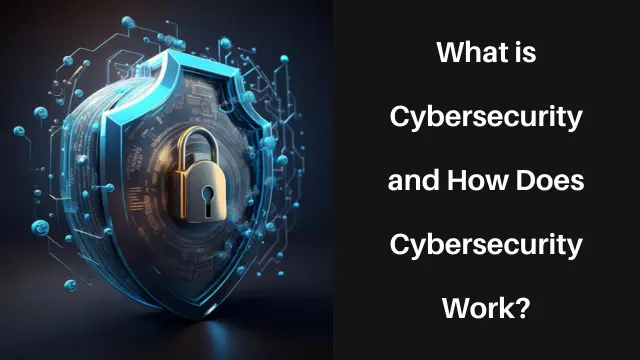
We’ve all been warned about the threats the internet can pose to us. Every time you’re online ads are popping up about which security software you should try because it is more effective than the previous one. As users, what we fail to do and don’t have time for is research. What are the possible threats? What can we do to protect ourselves from those threats? What is Cybersecurity? How does Cybersecurity work? Here’s everything you need to know about cybersecurity and eliminating potential risks and threats.
What Exactly Is Cybersecurity?
Cybersecurity is the practice of preventing digital attacks on computer systems, networks, data, and applications. Most cyberattacks are intended to gain access to, change, or delete information or extort money from users. Cybersecurity employs various methodologies, technologies, and processes to coordinate activities across all information systems, reducing the risk of cyberattacks and unauthorized system access. Cyber security is the prevention of cyber attacks on internet-connected systems, including software, equipment, and data. If you’re searching for IT services management, contact Circle MSP for more information, and contact us for a consultation to help you get started!
How does Cybersecurity Work?
Cybersecurity is meant to provide many layers of protection across your company’s computers, networks, and programs. It is vital that the company, individuals, procedures, and technology work together to establish a unified defense against potential cyberattacks.
Using software to safeguard your systems and networks is a barrier to hackers who favor easy targets that require less effort and have a lower risk of being discovered. Although no software can guarantee complete impenetrability, security software makes it far more difficult for cybercriminals to construct access points, and we can imagine it as an extra layer of protection.
Types of Cybersecurity Threats
Keeping up with new technologies, security trends, and threat intelligence is demanding. Nonetheless, it is required to protect information and other assets against cyber threats, which can take numerous forms. Let’s break it down:
- Malware is any file or software that is intended to harm a computer user, such as worms, computer viruses, Trojan horses, and spyware.
- Social engineering is an attack that leverages human interaction to trick users into breaking security rules to obtain sensitive information that is typically protected.
- Cyber-physical systems such as the power grid and water purification systems are examples of critical infrastructure security.
- Network security safeguards infrastructure and prevents outsiders from accessing internal networks. Two examples of network security are implementing two-factor authentication and fresh, strong passwords.
- The use of software and hardware to fight against external risks that may appear during the development stage of an application. Antivirus software, firewalls, and encryption are examples of application security.
- Information security, often known as InfoSec, safeguards physical and digital data in any form against unauthorized access, use, change, disclosure, deletion, or other malintent.
- Cloud security is a software-based application that secures and monitors your data in the cloud, assisting in the elimination of risks associated with on-premises threats.
Why is Cyber Security Important?
Strong cyber security should be a top priority for all businesses, regardless of size or industry. Organizations that maintain a consistent degree of security keep themselves safe from hackers and their clients safe; this feature increases their reputation by establishing them as trustworthy and secure.
Antivirus Software
Malware is detected and removed by antivirus software, which also prevents it from accessing the system in the first place. Malware is any program that has the capability of causing harm. Spyware, viruses, trojan horses, ransomware, and other forms of malware refer to numerous types of malware. Antivirus software works by regularly scanning your device and removing any previously installed malware. It will also look for potentially dangerous files in emails or direct messages and notify recipients or destroy them before they harm. Because malware is always evolving, it is vital to update antivirus software frequently to stay protected.
Encryption
Encryption uses algorithms to turn data into complicated codes. Users must have a key (decryption algorithm) to quickly access relevant information. Encrypting data reduces the possibility of unauthorized users accessing and exploiting it because they do not have the appropriate key. This type of security is frequently used when transmitting data over the Internet or storing data on portable devices.
Firewalls
Firewalls are the first line of defense, blocking certain types of network traffic and providing security against untrusted networks. Firewalls continuously monitor your device’s network traffic and refuse connection requests from any source it considers harmful. It functions as a filter, choosing what goes in and out of your network and providing you with an additional layer of security in addition to antivirus software. Firewalls come in a variety of configurations, including:
- Packet filtering firewalls have rules that govern what they will and will not allow to pass through. Because this type of firewall allows all online traffic through, it is ineffective against web-based threats.
- Deep packet inspection firewalls, in theory, analyze the contents of data packets and can distinguish attacks from normal access.
- Application-aware firewalls are comparable to deep packet inspection firewalls, but they are more intelligent and can determine whether certain programs are hazardous or benign.
- Application proxy firewalls intercept and validate traffic (e.g., emails, web traffic, etc.) before allowing it to proceed.
- Firewalls, like antivirus software, require regular updates. Users should never deny or ignore security software’s attempts to update themselves.
Circle MSP can protect your organization from data breaches and improve network security by periodically checking its overall security. For more information about IT services management and our cybersecurity services, check out our website. Let’s get started protecting you from cyber threats today!
